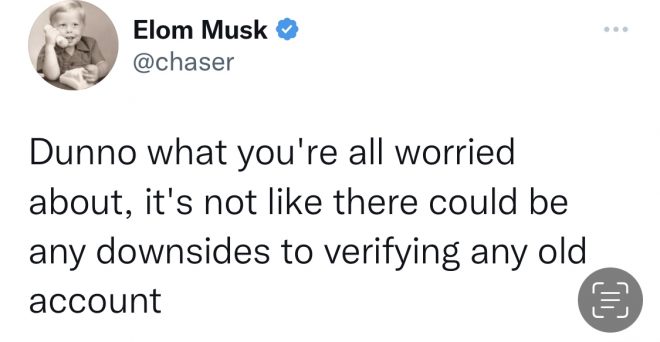Twitter Is Dying Before Our Very Eyes
If Myspace went out with a whimper; Twitter is going out with a bang.

If you’re not terminally online, you might be confused as to why your Twitter newsfeed resembles a heavily pitched battle between billionaire Elon Musk and, well, literally everyone else.
In a turn of events that evokes a forgotten episode of Succession, Musk’s bumpy transition into the role of Twitter CEO following a lengthy and troubled buyout has left the Tesla CEO in total control of the social media company, with literally nobody left to challenge Musk’s rule after he fired his fellow board members.
So, how has Musk fared after coming into possession of the world’s largest social media platform? In short, not great.
Musk Impersonators Run Amok
One of Musk’s first decisions as CEO was to re-imagine Twitter verification as a monthly subscription service. Yes, that blue tick that informs the public that your identity has been verified by expert fact-checkers is now for sale for a cool $8 USD per month!
Ironically, the consequences of launching a feature that allows people to become “verified” without providing any identification documents were immediately realised by none other than Musk himself, as thousands of users bearing the blue tick began impersonating the new company CEO for a laugh.


Promptly realising his mistake, Musk sternly informed Twitter that all impersonators would be banned from the platform unless they specifically wrote “parody” in their user handle.
we broke him in 9 days pic.twitter.com/q2ISPHYfZB
— slate (@PleaseBeGneiss) November 7, 2022
However, as Musk impersonators including US comedian Sarah Silverman and Kathy Griffith were banned from the platform in droves (including some who even complied with Musk’s instructions of clearly putting “parody” in their user handle), profound policy flaws emerged around Twitter’s most treasured pastime: satire.
Harry Potter star Daniel Radcliffe received a prompt ban on Twitter after committing the crime of impersonating Weird Al Yankovic, who Radcliffe plays in a new satirical biopic. Weird Al himself took to Twitter to protest the move, arguing it was pretty freaking obvious Radcliffe was just doing some harmless promotion for the new series.
Oh no, they suspended @danielradcliffe‘s Twitter account! Wasn’t it obvious he was doing a PARODY???
— Al Yankovic (@alyankovic) November 7, 2022
So despite stating at the start of his reign that Twitter would become a haven of free speech, so far Musk’s current policies have simply made it harder to be funny on Twitter. Oh yeah, and hate speech has reportedly risen by 500 percent.
elon musk [parody] [humor] [any individuals in this text (referred to henceforth as “the tweet”) are named on a satirical basis] [the tweet is not a statement of fact, with protection as codified in 17 USC §107 & affirmed in Hustler Mag v Falwell (1988)]: boy i love sippin piss
— soul nate (@MNateShyamalan) November 7, 2022
Australian Twitter Employees Are Stuck In Limbo
Musk’s second big decision as Twitter CEO was equally bombastic. Across the globe, Twitter employees were reportedly being assessed by how much they contributed to the platform’s system code. Those with a productivity quota under a certain threshold were promptly made redundant, resulting in over 50 percent of Twitter’s total staff being let go.
But as Twitter executives soon discovered, employees who delivered work more slowly weren’t necessarily bad workers — they could have just been working on more difficult fields like the user accessibility or ethics and accountability departments; both of which were completely gutted by the redundancy measures.
Realising the error, Twitter executives reportedly began to reach out to recently laid-off employees, requesting them to return to the company to help implement upcoming features promised by Musk.
Down under, things played out much the same. Australian Twitter staff reported being locked out of company email accounts and laptops, and their employment status designated to a state of purgatory.
To follow from this story Friday after Twitter Australia staff were locked out of work systems — have heard from various sources that for many staff, their status still remains broadly in limbo: haven’t yet officially been given notice, but haven’t been officially kept on either https://t.co/oFuopVLgD2
— Ariel Bogle (@arielbogle) November 7, 2022
Revenue Plummets As Twitter Users Flee The Platform
The immediate consequences of all the redundancies and upheaval from Musk’s brief time as Twitter CEO have been felt in one of the most sensitive areas for a social media platform: advertising revenue. Musk took to Twitter to gravely announce that a “massive drop in revenue” had been inflicted by “activists” who were “trying to destroy free speech in America”. Advertisers had a different view, calling out Musk in the comments section of his own tweet to explain that their hesitancy to continue advertising on Twitter was based on concerns about how the content moderation team had been affected by the recent lay-offs.
Elon, Great chat yesterday, As you heard overwhelmingly from senior advertisers on the call, the issue concerning us all is content moderation and its impact on BRAND SAFETY/SUITABILITY. You say you’re committed to moderation, but you just laid off 75% of the moderation team!
— Lou Paskalis ?? (@LouPas) November 4, 2022
With Twitter burdened with approximately $1.4 billion in debt and losing $4 million USD per day, many users are looking to escape amid the chaos. Microblogging app Mastodon — not to be mistaken for the 2000s metal group — has received reached a total of one million users, gaining over 230,000 new users in just two weeks despite steep learning curves that have bamboozled those newly initiated to the open source platform.
Going to mastodon is kind of like moving to the country.
— The Twindenberg (@jonkudelka) November 7, 2022
When someone explains how Mastodon works pic.twitter.com/nbGUnKPBJS
— Casey Stegman (now on Mastodon) (@cstegman) November 5, 2022
Despite all the chaos and confusion, one thing is certain. Unlike websites like MySpace that passed away easily in the night, Twitter will not be granted a slow and peaceful death. Under Musk’s leadership, it’s heading for a bang, not a whimper.

